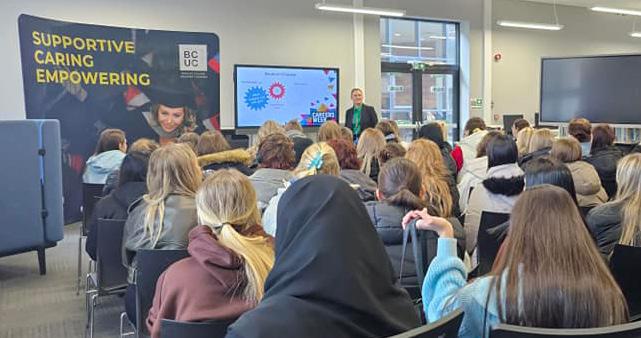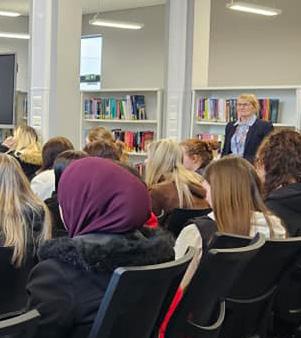TAKING THE NEXT STEP HOW TO APPLY FOR UNIVERSITY
A guide for Students and their Parents/Guardians
BUILDING FUTURES. CHANGING LIVES.
WHERE? WHAT? WHEN? HOW?

You may already have lots of questions about making the important transition from College to University.
Whether you’re a Student or their parent/guardian, we know you want the right advice at the right time. That’s why, at Burnley College Sixth Form Centre, we offer a comprehensive advice and guidance service to help you every step of the way with individualised support.
2

CONTENTS 04 06 07 08 09 09 10 12 14 16 Our support Choosing the right university for you Discovering more about your choices How to complete your UCAS application Personal statement References/the importance of a personal statement Submitting your application What happens next? Student finance Frequently asked questions 3
OUR SUPPORT
We’ve helped thousands of students as they make the move into the next phase of their educational careers.
Our expert Careers Team have a wide range of services available including:
• Personal statement checking
Ensure your statement is accurate, contains all the information required, is captivating and is of course, spelled correctly.
• University drop ins
Meet face to face with representatives from your preferred Universities and explore others too all onsite at Burnley College.
> These will be highlighted on the College screens and Google Classroom.
• Tutorials and Workshops
Learn how to turn your personal statement from “good” to “exceptional”, how to get the most out of your university visits, how to research your potential course and careers and much more.
> Your Tutors will advise of these dates.
• One-to-one appointments
Get personal advice face-to-face with our friendly Careers Team.


Book an appointment with the Careers Team
Email: your.future@burnley.ac.uk or scan the QR code
4


5
CHOOSING THE RIGHT UNIVERSITY FOR YOU
How do you choose the best University for you? There is no one answer to this question. It very much depends on what you want from your university experience.
• Choosing a Course - prioritise universities that offer courses aligned with your career goals. Consider factors such as course reputation, faculty, student support services and results records.
• Lifestyle Preferences – are you looking for an active social life, a quiet study-focussed environment, or a balanced mix?
• Living Arrangements – living at home can save thousands of pounds, whereas some consider the campus experience to be vital to their university life. Each option has its advantages and challenges - weigh them carefully.
These are just a few of the things you need to consider carefully.
Don’t worry though. Our expert Careers team run multiple sessions to support you through the process. Just book an appointment for advice and guidance (details on page 4).
They’ll also show you how to do your own research using sites such as
www.ucas.com
www.whatuni.com
www.thestudentroom.co.uk

6
DISCOVERING MORE ABOUT YOUR CHOICES
Researching your universities of choice is essential. There are many ways to do this which range from online searches to visiting the university itself.
Firstly, simply visit the university’s website. While the quality and size of these may vary, it’s a chance to discover in depth what they have to offer. Look at the courses available, explore the facilities, read case studies of students similar to yourself, or your young person, and see how their time at the university benefited them.
Take your time to look around social media too. Universities are proud of their campuses and will regularly share photos, stories and information about what’s happening and upcoming events. It’s a great way to help you imagine your life there as an undergraduate.
You can also use whatuni.com and the studentroom.co.uk to find out what the undergraduates there think of their university.

The next step is to ensure it’s the correct destination for you. Does it offer the course that suits you best? You might have an amazing time living there for three years, but if you don’t come away with a useful qualification, it may have been for nothing.
Check the entry requirements and make sure you are confident you will achieve them. You only get five choices on your UCAS form, so don’t waste one on a university which is unlikely to accept you.
Finally when you have some solid choices in mind it is always worthwhile attending an open day. Most universities hold at least one or two events for prospective students to visit and get a feel for the place. You’ll have the opportunity to explore the campus, the wider city or town and to talk to lecturers to find out more about your course.
Research is key to ensuring you choose the right course at the best university for you. Explore with an open mind and you will find somewhere which feels right.
Burnley.ac.uk | 01282 733623 7
HOW TO COMPLETE YOUR UCAS APPLICATION
YOUR APPLICATION
Your UCAS application is your passport to the future and securing a place in your dream university. So therefore it is vitally important to get the application process right.
Here is an introduction into how to complete the form. However, don't forget our expert Careers Team are on hand to help you construct the perfect personal statement.
An application checking service is also available for those who hand in their completed form ahead of the Careers Team's deadline.
Ensure you use correct grammar and spelling, capitalising words where appropriate.
To start with though, let’s have a look at the various sections.
PERSONAL INFORMATION
In this section, you will need to provide your personal details:
• Full Name
• Date of Birth
• Residential Address
• Nationality
• Language Skills
• Where your funding will come from*
• Contact Information.
*This will be explained in your application workshop.
EDUCATION
Documenting your academic qualifications accurately is essential.
If you're currently studying, you will need to include these courses, even if you haven't received your results yet. For these, you should enter your predicted grades. Your Tutor will provide these.
You'll also need to share your educational history, which includes your previous schools or colleges attended, and ALL qualifications you've achieved.
Remember, honesty is the best policy and don’t leave out results just because you were disappointed with the grade.
Ensuring this section is correct will affirm to universities that you're academically capable of undertaking their course and are trustworthy.

8
PERSONAL STATEMENT
Your personal statement is a golden opportunity to showcase your unique personality, aspirations, and academic prowess.
A personal statement is more than just a formality. This critical piece of writing can help you stand out from the crowd, paving your way into your dream University.
It provides a platform to articulate your motivations for choosing a particular course, your relevant skills and experiences, as well as your future career plans.
Crafting Your Personal Statement
Begin with an engaging introduction that captures attention. It could be a quote, an anecdote, or a profound statement that encapsulates the essence of your motivation for your chosen subject.
Highlight your interest in the course, your understanding of it and how it aligns with your future plans. Discuss any relevant skills, achievements, work experience, or volunteering that has prepared you for this course.
Steer clear of clichés, generic statements, and overused phrases. Be authentic and original in your approach. Use clear, concise, and formal language. Avoid jargon and keep your sentences short and precise.
Read it through, aloud if possible, to ensure it flows and is easy to read. A well-structured statement with a logical flow of ideas makes it more enjoyable for the reader to follow your thoughts.
Most importantly, make your statement unique to you. The admissions committee wants to know about you as an individual, not just as a student. For this very reason, never be tempted to use AI or to copy and paste a template statement online. It will be immediately clear to the admissions committee this writing is not personal and could even lead them to believe you are someone who would rather copy others' work than create original material.
Burnley.ac.uk | 01282 733623 9


REFERENCE
Your reference is an important part of your UCAS application. They offer universities another perspective on your ability to succeed in higher education.
Burnley College will provide this reference for you and add it to your application.
YOUR CHANCE TO SHINE
At first your UCAS application may seem daunting, but by breaking it down into manageable sections and taking the time to accurately fill in each part, you're well on your way to showcasing your potential to your chosen universities.
Remember, this is your chance to shinemake the most of it!
10

SUBMITTING YOUR APPLICATION
At Burnley College we offer individualised support to every Student. That includes providing a guaranteed personalised checking service for UCAS forms for every Student who wants it.
In order to ensure we can give each application the time it deserves, we ask students to supply us with their completed application two months ahead of the official UCAS deadline.
Our Careers Team will then carefully work through the application to confirm results have been entered accurately, funding information is correct and other technical details alongside spelling and grammar and, perhaps most importantly, your personal statement.
After your UCAS form has been checked it will be returned to you with a list of suggestions on how it could be improved, from simple corrections, to advice about your personal statement and how to make it stand out even more.
You will be made aware of the internal deadline well in advance so you can ensure you’re happy with the application before the Careers Team even see it.
For those that miss our internal deadline, we may not be able to guarantee this full checking service, so it pays to be prepared well in advance.
Burnley.ac.uk | 01282 733623 11
WHAT HAPPENS NEXT?
Once your application has been polished to perfection and submitted, the journey begins!
Acknowledgement from UCAS: Within a few days of submitting your application, UCAS sends an email acknowledging receipt. This email includes a personal ID number, which is crucial for tracking your application's progress.
Waiting for University Decisions: Universities review your application. This phase can take several weeks as institutions carefully consider each application.
Receiving Offers: As universities make their decisions, you will start receiving offers. These can be either conditional (based on achieving certain grades) or unconditional (you have a guaranteed place).
Replying to Offers: After all your chosen universities have responded, it's time to reply to your offers. You can accept two offers – one as your firm choice and one as your insurance choice.
Results Day: On results day, check UCAS Track to see if your place has been confirmed. If your grades meet the requirements of your firm choice, your place at that university is confirmed. If not, your insurance choice is considered next.
Clearing (if applicable): If you didn't meet the conditions of either your firm or insurance offers, or you applied late, Clearing allows you to apply for courses that still have vacancies from July to September.
12
UCAS Extra
If you didn't receive any offers, don’t worry. There's still an opportunity to secure your place at a UK university with UCAS Extra.
What is UCAS Extra?
UCAS Extra serves as a lifeline for those who have exhausted all five choices in their initial UCAS application but have not received any offers or have decided to decline the offers they have received.
How does UCAS Extra work?
From late February to early July, you can apply for one course at a time. If you get an offer from a university and accept it, you won't be able to apply to other courses. If you don't get an offer or decide to decline it, you can apply for another course.
If you are in this situation, make sure you make the most of UCAS Extra.
Explore available courses on the UCAS website. Consider different courses or universities that you haven't applied to before.
Contact the university before applying. It's wise to do this to confirm if they have spaces and will consider your application.
You may need to tweak your personal statement to reflect your interest in the new course or university.
Apply through the 'Add an Extra Choice' option on your UCAS Track.
Burnley.ac.uk | 01282 733623 13

STUDENT FINANCE
Understanding University Costs
University costs break down into two categories: tuition costs and living costs.
Tuition costs in the UK are £9,250 per year, however, these can vary greatly depending on the university and the course (correct as of Jan 2024).
Living costs include accommodation, food, transport, textbooks, and personal expenses. Accommodation costs can range anywhere between £80 - £150 per week, depending on whether you choose to live in university halls of residence or private accommodation. You must also budget for groceries and social activities. This can vary greatly depending on your lifestyle.
Student Loans: An Overview
Student Loans in the UK are typically divided into two categories: Tuition Fee Loans and Maintenance Loans. Tuition Fee Loans cover the full cost of your course and are paid directly to the course provider. Maintenance Loans are designed to help with your living costs and are paid directly into your bank account at the start of each term.
Grants and Scholarships:
Grants and scholarships are types of financial aid that you don’t have to repay. Grants are often need-based and might be offered to students who come from low-income families. Scholarships, on the other hand, are often merit-based and are awarded based on academic achievements.
Universities, governmental bodies, and private organisations offer multple grants and scholarships. Research these opportunities and apply for those you are eligible for.
For more information speak to the Careers Team: your.future@burnley.ac.uk
14

Applying for Student Finance: A Step-by-Step Guide
Applying for Student Finance in the UK involves several steps.
• Register for a Student Finance account. This is the online platform where you will apply for and manage your financial aid.
• Fill out your personal and course details. This will include information about your university and the course you plan to study.
• Provide your household income. This is used to determine your Maintenance Loan amount.
• Sign and return the loan declaration. This is the final step in the application process and legally confirms your acceptance of the loan.
Remember, applying as early as possible increases your chances of receiving the funds in time to start your course. Applications open around March.
Start your Student Finance application at: www.gov.uk/student-finance-register-login
Understanding Loan Repayments
When repaying your loan, the repayments are tied to your income, not how much you borrowed. You start repaying your student loan only if your income is over the repayment threshold.
For the very latest on repayment thresholds and repayment limits, please visit www.gov.uk/repaying-your-student-loan
Essential Deadlines
In England, new students need to apply by the end of May for courses starting in the autumn. Returning students should apply by the end of June. However, it's advisable to apply as early as possible.
If you require any assistance understanding and getting guidance about student finance, talk to our expert Careers Team who will be able to signpost you to the help you need.
FREQUENTLY ASKED QUESTIONS ABOUT UNIVERSITY APPLICATIONS
How many universities can I apply to?
Up to five Universities can be chosen on a single application. This is a unique opportunity to apply to multiple institutions simultaneously, increasing your chances of securing a place at a university that suits your aspirations and goals. If you are unsuccessful with your first five, UCAS Extra offers an opportunity to apply to further universities.
Do I need 5 choices to be able to submit my application?
No. While having five choices offers a wider range of possibilities, it is by no means essential. Your application can be submitted with as few as one choice.
Is it free to apply?
A fee of £27.50 per application includes up to five University choices (correct as of Jan 2024).
Does my application go straight to UCAS?
You have the option at Burnley College for our Expert Careers Team to read through your application, checking for errors and offering advice on how to make it stand out from the rest. After that’s completed, all applications are sent directly to UCAS, who then forward them to your chosen Universities. It's a streamlined process, designed to make your application journey as smooth as possible.
If I change my mind can I amend my application once it has been submitted?
You can amend very specific parts of your application after it's submitted. However, the personal statement and university/college choices cannot be changed. It's essential to be sure about these aspects and make it the best it can possibly be before hitting the submit button. That’s why we recommend using our checking service.
If I am applying for Burnley College University Courses (BCUC) do I need to apply through UCAS?
You can apply to BCUC directly or through UCAS. You can speak to the Careers Team or hesupport@burnley.ac.uk for application support
16
APPLICATION TIMELINE
February & March (Year 1)
Prepare for University sessionsAsk Tutors for more details.
April
How to write a Personal Statement sessions - Ask Tutors for more details
Begin research & start writing your Personal Statement.
May
UCAS Registration sessionsAsk Tutors for more details
Register on UCAS and start your application.
June, July & August
Visit the universities you are interested in attending.
Continue work on your personal statement. You can send a draft to us for checking at your.future@burnley.ac.uk
September (Year 2)
Applications can be submitted to UCAS.
October
Deadline for The Universities of Oxford and Cambridge (Oxbridge) Medicine, Dentist and Veterinary undergraduate applications.
November
Burnley College deadline for all other undergraduate applications to be submitted for checking.
January
UCAS deadline for applications to be submitted to UCAS by Burnley College.
February
UCAS Extra opens
Student Finance applications open
Student Finance sessionsAsk Tutors for more details
May
Make firm and insurance choices from your university offers.
Start to look at student accommodation.
July Clearing opens.
August
Results Day!!
Confirm your place at University and finalise Student Finance.
Burnley.ac.uk | 01282 733623 17
CONTACT DETAILS CAREERS TEAM your.future@burnley.ac.uk | 01282 733623 TARIFF POINTS A LEVEL BTEC T LEVEL 168 D* 144 D 120 M 96 P (C or above on Core) 72 P (D or E above on Core) 56 A* D* 48 A D 40 B 32 C M 24 D 16 E P
UCAS POINTS TABLE












